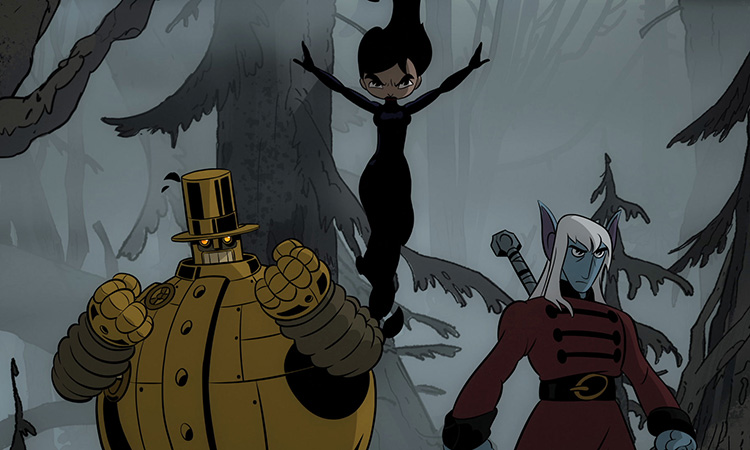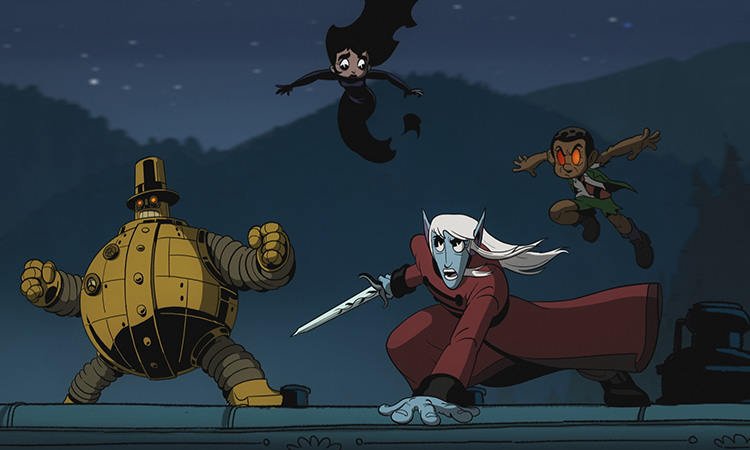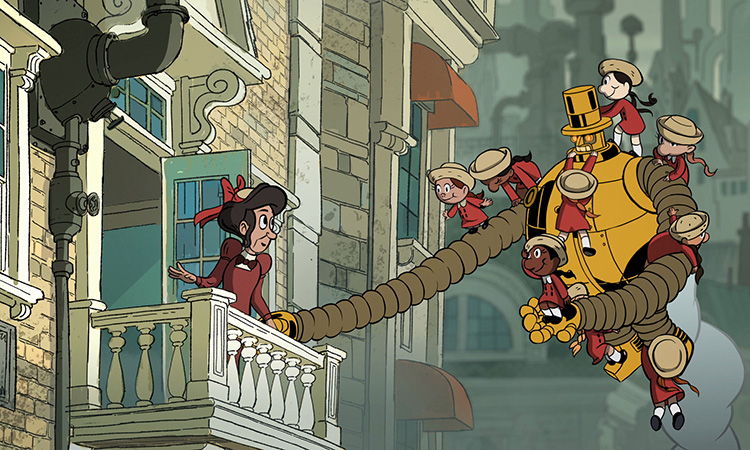From five-time Emmy® Award-winning Genndy Tartakovsky (Dexter’s Laboratory, Samurai Jack, Primal) comes a new supernatural animated fantasy, Unicorn: Warriors Eternal.
The series follows a team of heroes who reawaken to fight an ominous force throughout eternity and was created by Tartakovsky in his early days at Cartoon Network Studios more than 20 years ago. In fact, he’s said that his previous series Dexter’s Laboratory, Samurai Jack, and Sym-Bionic Titan were “like a training ground getting us ready for this series”.
The show will be heading our way this May on All 4 via Adult Swim, so we sat down with Tartakovsky (pictured above) to find out more about his new series, his creative process and how his new deal with Warner Bros may impact his future work…
You’ve said that Unicorn: Warriors Eternal has taken 20 years to make, why is that?
I don’t know, it’s Hollywood, it’s difficult to answer sometimes.
But it was different. Back then there were no episodic animated shows; everything had to be standalone and this is definitely one story that I wanted to tell.
Almost everything I’ve done is a little bit before its time, [Samurai] Jack definitely was a little bit different and Primal was obviously different. So it was just one of those things that were very hard to pitch.
Also because it’s on such a huge scale, I had to figure out how to properly sell it, and it was just different enough that it was challenging to sell. But I kept at it – there was something about the idea that I really loved and so I stayed with it.
What is it about these characters that you couldn’t let go on from that first idea, to want to revisit them all these years later?
Well, I think each show that I create is like having a baby. Once I start drawing the characters, and I have ideas, I start to envision it and then I see it, and then it’s born. And I can’t kill my baby.
You fall in love with it and you want to execute it so then you can really react to it and other people can react to it.
I’m a very driven person and I never wanted to give up on it. Right before I sold it, my friends would always go ‘Genndy, stop pitching the show. Nobody wants it anymore. Just give up on it’ and I just couldn’t. It needs to exist for me, so I just never quit on it.
It’s hard. But I’ve had other ideas that I did quit on like ‘ah, this one just doesn’t feel right. It needs to be thought about more’. But this one, there was always something about it that stuck.

How has Unicorn: Warriors Eternal evolved during that 20 years?
It evolved quite a bit. Everything that I wanted to do in Unicorn, we were doing earlier, like in Dexter and Powerpuff, where it was action, comedy and drama. And Dexter was very comedy and then action. Comedy was the most important thing.
But for Unicorn I wanted to do something much more emotional. So we wanted to do action with this emotional level and still a level of comedy underneath it. So basically, I was training. Every project I do, I feel like I get a little better at doing an element of it, and I think Unicorn really benefited from the 20 year gestation of it getting developed and getting it sold.
I’m now in a stronger command of my abilities. [There’s] still a long way to go to where I really want to be, but definitely I’ve figured out a way to tell these stories better. Where if we ended up doing it in 2003, who knows how it would have been…
I believe in destiny and fate and the organic process of shows. Sometimes it’s easy to sell a show and have it come up, like Primal was kind of quick, and other times it’s the longest journey like Unicorn.
Have you found there have been many differences in making kids shows in the 90s and working in animation now in the age of streaming?
For me, I was just starting out. I was 24 when we started doing Dexter, so I knew nothing. I was just kind of thrown in to do it and it all just kind of happened.
Now, 30 years later, I’m so much more experienced. You learn a lot. So I’m in much more command of what I’m doing. Before we were trying to do something, but it was definitely more… I don’t want to say accidental but we were learning a lot.
But basically streaming, when we were doing shows back then it was Nickelodeon, Cartoon Network and Disney Channel who had just kind of started. And that’s it. That’s your output. Now there are like ten different places you can really sell to.
So the opportunities, especially a couple of years ago, were crazy. So that makes it very competitive and easier. Back then, we were the first generation of younger filmmakers. Everybody else was in their 40s and nowadays, it’s completely open. They’ll take pitches from pretty much anybody in a way that has all these opportunities to tell your stories. So it’s very different.
What are your biggest influences?
I think my influences are always inside of me. It’s not like I go ‘I want to copy this’. I don’t think about it that way. I wanted to do cartoony characters, so that’s like the Tezuka influence. Then I wanted to do high action and drama, and I don’t know what I turned to for that. It’s probably live action, if anything. Then I definitely want to do a Miyazaki type of world-building.
It’s all just in there and it’s swirling around and once I start drawing, it comes out as what it is. So the balance is just more of an inspiration.
Whenever I make a project the goal is to have an audience have a certain feel or tone that they’re getting from the show. So that was the goal. I want to feel like I’m watching something dramatic, that has some humour, that has a cartoony design. It has a big, lush, rich world, and a very, complex big story. From episode to episode, you find out a little more. It’s kind of a mystery. That was the goal.

Can you talk us through your creative processes on a project on Unicorn: Warriors Eternal?
A simple question haha!
I always start with the drawing and then I think of ideas. Usually, before I do any show, I try to write down ten ideas for the show. Like ten episodes, and if that’s hard to do, I know there’s a big problem and I have to figure out what to do about it.
I’m storyboarding now more than I ever have in my career. I did I think seven out of ten episodes of Primal, about the same amount for Unicorn. Before I would storyboard maybe, one or two episodes a season, because I had a big crew. But now I can draw a little better than I did when I was younger, because I struggled with drawing a lot. So now it’s fun to do storyboards and to tell the stories and I have a lot of freedom. So the pressure is just to make it good.
The last seasons of Samurai Jack and Primal War were quite dark, while Unicorn: Warriors Eternal is a little lighter – was that your intention to move on to something less dark for this, your most recent project?
No. Definitely, the last season of Jack and Primal are very dark and violent but I initially developed [Unicorn] at Cartoon Network and nobody even talked about adult cartoons back then (besides The Simpsons), so I stayed on that path.
But it’s certainly mature and sophisticated in its themes. There was no reason for it to be gory or violent and I’m not that person. I don’t like horror films. I don’t like gory, violent films.
Primal required it. To really feel the complexity and the hardcore [elements] of that world, the rawness and the primal-ness of it all, it needed that. Unicorn doesn’t need that. I can get it across without having to do blood and gore. So it’s much more heady and hopefully emotional.
If I can really get you sold on the characters and their emotions and what it means for them, then I’ll be successful. Which is the hardest thing to do.
It’s easy to give you some violence and sex. That’s the easy sell. But can you do it under control? Almost anybody (I would say, probably older than 10) can watch Unicorn.
Ever since Dexter, I haven’t made [a project] for an audience because I don’t know what you like. I don’t know what a 10-year-old kid likes. I just know what I like and some of the people around me. So as long as it entertained us, then we knew we had something.

What was the most difficult element to produce on Unicorn: Warriors Eternal?
Surprisingly the hardest thing about it was the cartoony-ness of it. Which is surprising coming off Primal. The studio that did the animation on Primal was Studio La Cachette and they did such an incredible job on Primal that I thought Unicorn would be easier because they’re cartoony characters, and Primal was so real and detailed.
[But] what I realised was that that language is forgotten. This cartoony language from the Thirties and Forties that was a part of my childhood and what I liked, getting into animation, is gone.
So we had to teach them the principles of this cartoony style of animation and it was incredibly difficult, in the beginning especially. Because the acting is so much different, the style of animation is very different…
So me and Steven de Stefano, the character designer, would get a scene and then we would redraw the poses. I would even animate some things to show [what I wanted].
I thought this would be the easiest part of it, but it became the hardest part.
The other [difficulty] was wrangling the story to be simple, but still fun. It has a complex vibe to it and [wrangling] the ups and downs through the season and making sure that by the time you get to episodes 7,8,9 and 10, it becomes crazy and it’s fast.
You’ve signed a huge deal with Cartoon Network Studios and Warner Brothers animation studios – is there anything from Warner Bros that you’d like to put your own spin on?
The funny thing is that I signed that deal and within my contract [it says] that I don’t have to do anything I don’t want to do because I wanted to do my own thing.
After doing Star Wars: Clone Wars, that’s the biggest franchise you can imagine?! I have a lot of my own ideas and with the success of Primal and Samurai Jack, I want to keep going with my ideas. We’ve talked about things that I might want to do with the library and so I don’t know. Obviously, I love Bugs Bunny, but they’re doing stuff and there’s no reason for me to do it.
I think probably if I had to choose something, it would be something from comic books. Not Batman or Superman or anything but something smaller, maybe Kamandi [The Last Boy On Earth], the Jack Kirby comic book. Maybe The Demon [Etrigan].
But generally, at the point where I’m at in my career, it’s really about the opportunity to do more of my own work. I think that’s important. I wanted it clear when we signed the deal that there are no surprises. That I want a place to make my own work and I feel like after 30 years, my career is just starting.
I think I say that every time a new show comes out, but that’s how I feel!
The first two episodes of Unicorn: Warriors Eternal will premiere on Friday 5 May on All 4 in the UK and Ireland.
